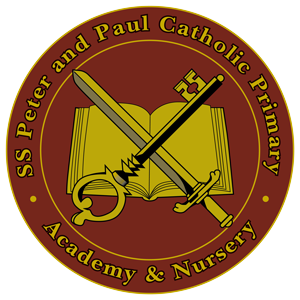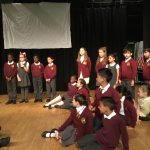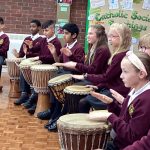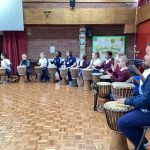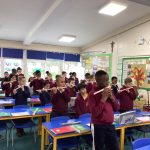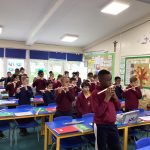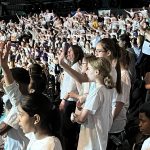Intent
At SS Peter & Paul we believe that each child should be exposed to a broad and rich music curriculum throughout their whole school journey. Music is a unique way of communicating that can inspire and motivate children through opportunities for personal expression and we believe that it can reflect the culture and society we live in. Music enriches many of our other curriculum areas. Through our teaching of music, we enable children to better understand the world we live in now and the history behind some of the music around them. Our curriculum also gives them the opportunity to explore their community and then the wider world. Our intention is that children gain a firm understanding of what music is through listening & appraising, performing and composing across a wide variety of historical periods, styles, traditions, and musical genres.
The National Curriculum for music aims to ensure that all pupils:
- Perform, listen to, review and evaluate music
- Be taught to sing, create and compose music
- Understand and explore how music is created, produced and communicated.
To meet these aims we have decided to focus on the three concepts of listening (& appraising), composing and performing throughout our curriculum at SS Peter & Paul. In doing so, our aim is for pupils to become increasingly better musicians, more sophisticated listeners, more competent & expressive performers and better composers.
We want music to inspire self-confidence in our children through development of an engaging and safe learning environment, as well as encouraging a feeling of fellowship through shared creation and appreciation of music.
Implementation
The music curriculum at SS Peter & Paul music lessons are delivered at regular opportunities in order for pupils to practise skills and build up knowledge incrementally. We find that regularly distributed lessons in music help pupils at SS Peter and Paul know more and remember more. Music also features prominently in hymn practices, assemblies, liturgy and various concerts and performances (both in and out of school). Music is taught as an integral part of the topic work in Early Years covered during the year. We relate the musical aspects of the children’s work to the objectives set out in the Early Learning Goals (ELGs) which underpin the curriculum planning for children aged three to five.
Classroom music is taught using the online scheme ‘Charanga’ as a foundation, but enhanced through the high quality teaching of our music teacher, and specialist input from the Wolverhampton Music School delivering instrumental teaching in lower KS2.
Charanga’s scheme for the Model Music Curriculum follows ‘a differentiated, spiral approach to musical learning’. Since spring 2023 we are following this model curriculum. Within each unit of learning, students revisit existing knowledge and skills and then build upon and extend them incrementally. In this manner, learning is consolidated and augmented, allowing increasing musical confidence, while constantly being gently challenged to go further.
Impact
Children will experience a range of music from different genres and eras. They will have an understanding of musical language and how to use it in context when discussing a piece of music and critiquing their own composed pieces. Children will develop performance skills through playing a range of instruments across the curriculum and performing them to an audience. This will foster a love of music through the knowledge of musical history and the origin of music.
Children are able to enjoy music and become better musicians as listener, composer or performer:
- They can listen deeply, examining the different parts of a piece of music
- They can sing and feel a beat
- They enjoy the feeling of togetherness created by singing together
- They have an understanding of how to further develop skills less known to them, should they ever develop an interest in their lives.
- The enhanced positivity that music can promote may be seen in other subjects in the wider curriculum.
We engender a strong musical culture whereby the music curriculum is also supported by extracurricular musical opportunities (clubs, assemblies, liturgies, ensembles), memorable experiences (concerts, workshops) and instrumental lessons. A strong musical culture is supported by school leaders to help pupils flourish in music and ultimately become more musical – as such we are an accredited ArtsMark Silver Award School.
Documents
- 1) Music Long Term Plan 2023-24.pdf pdf127.6 KbSep 21st, 2023
- 2) Knowledge, Skills and Learning Progression in a Spiral Curriculum.pdf pdf1.6 MbSep 21st, 2023
- 3) MMC Glossary.pdf pdf60.8 KbSep 21st, 2023
- 4) MMC Progression of Knowledge and Skills Years 1-6.pdf pdf133.3 KbSep 21st, 2023
- 5) Music Development Plan 2024-25.pdf pdf181.5 KbSep 24th, 2024
